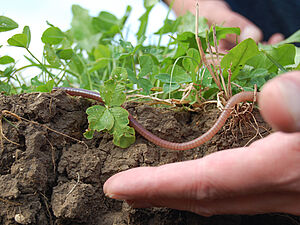Given the rising world population, sustainable solutions must be developed in the agricultural sector in order to combat the global loss of valuable arable soils and to mitigate climate change. Recent studies have shown that even back in antiquity, the cutting down of forests and intensive plough-based farming or overgrazing with livestock resulted in the collapse of civilisations. Over the past 40 years approximately one third of the fertile arable soils worldwide have been lost to erosion. This trend continues almost unnoticed. Deep ploughing leads to the decomposition of valuable soil humus and the carbon it contains is lost to the atmosphere in the form of CO2 , the most significant of greenhouse gases. Every year an average of one millimetre of soil is lost to this insidious process of erosion and thus contributes to global warming. Topsoil generation, in contrast, is a much slower process. Soils are also being degraded as a result of other agricultural practices such as monoculture cropping, intensive irrigation, unbalanced applications of mononutrient fertilisers, the burning or removal of harvest residues and improper use of pesticides. Mankind is in the process of losing its most important natural resource base, the living skin of planet Earth.
FiBL’s Department of Soil Sciences is studying this natural resource base on which life depends. The department’s research team focuses on soil quality and soil functions as well as on plant symbioses and climate change in the organic farming context. The many studies conducted by FiBL include a number of long-term trials, some of which have been running for decades. Paul Mäder, Head of the Department of Soil Sciences, stresses that the climate component must also be addressed, as the climate has a crucial impact on soil processes, while at the same time soil cultivation impacts on the climate.
On the following pages you can find background information on the topic of soils as well as information on FiBL’s projects, publications and news.




